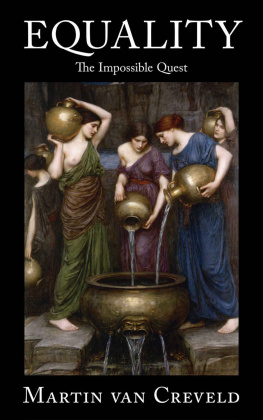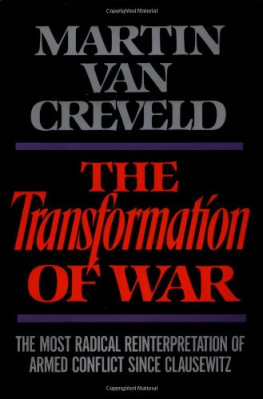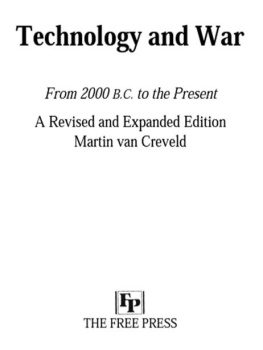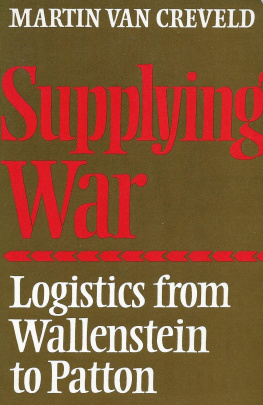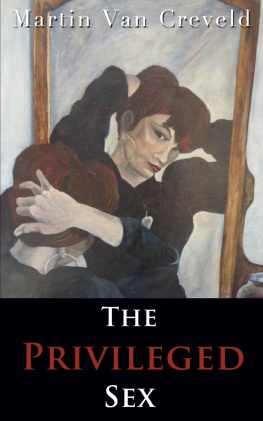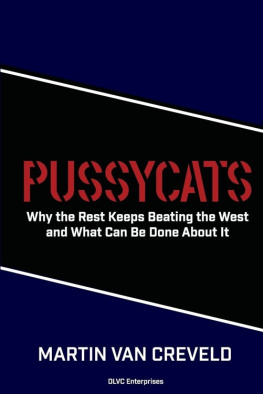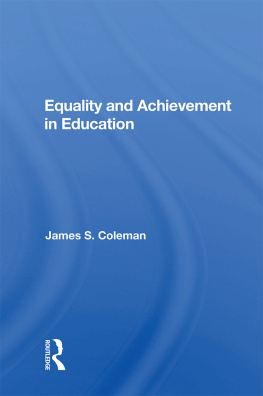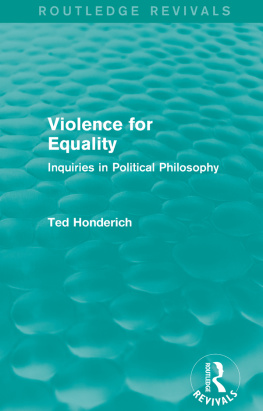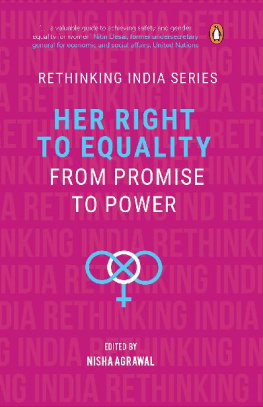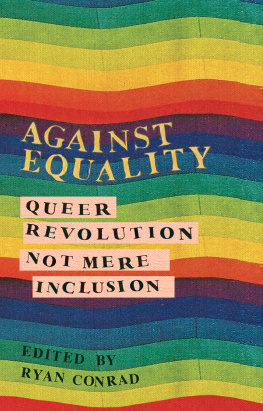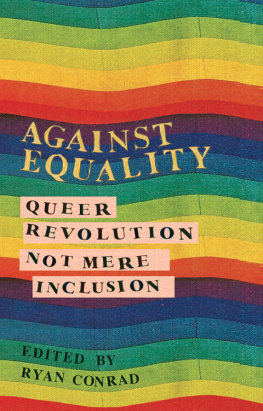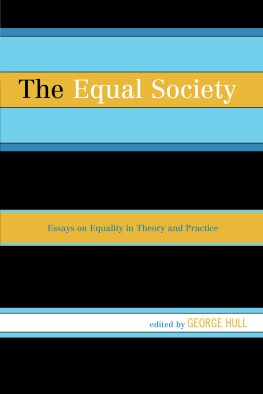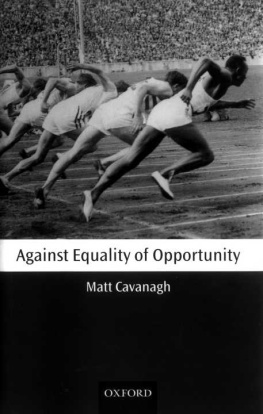Equality: The Impossible Quest
by Martin van Creveld
Published by Castalia House
Kouvola, Finland
www.castaliahouse.com
This book or parts thereof may not be reproduced in any form, stored in a retrieval system, or transmitted in any form by any meanselectronic, mechanical, photocopy, recording, or otherwisewithout prior written permission of the publisher, except as provided by Finnish copyright law.
Copyright 2015 by Martin van Creveld
All rights reserved
Editor: Vox Day
Cover Design: Christopher Jallini
Cover Image: The Danaides, John William Waterhouse (1903)
Version 001
Table of Contents
Introduction
The histories of justice and liberty have often been written. Not so that of equality, which, so far has failed to find its proper biographer. There seems to be no equivalent to Plato's On Justice (better known as The Republic) or to John Stuart Mills OnLiberty. That is strange, for equality is quite as important as the other two. Never has this been more true than in our own day. On one hand, we are inundated by volumes that warn us of the dangers of growing socio-economic gaps and by movements that protest against those gaps. On the other, equalitys opposite, discrimination, has not only become taboo but is being used as a lever for all kinds of social reforms, credible and incredible alike.
In fact, so closely linked are the three concepts as to be inseparable. Where there is no equality there can be neither justice nor liberty. On the other hand, equality itself is not without its dangers. Should it be pushed too far, it can easily reach the point where it limits, or even eliminates, both liberty and justice. Most people will agree that, for both individuals and communities to be able to lead the good life, a proper mixture of all three qualities is needed. Yet submitting a comprehensive plan as to precisely what the mixture should be like is beyond the powers of the present author. Instead, while keeping the other members of the trio in mind, this volume will trace the history of equality from the earliest times. This includes its origins, its development, the various forms it has taken, its benefits and its costs.
On the face of it equality is a simple conceptwhat could be simpler? In reality, nothing is further from the truth. To realize this fact, all one has to do is to follow the tortuous phraseology of Sun Yat Sen, the great early twentieth-century Chinese revolutionary and reformer. Sun Yat Sen received parts of his education in Hawaii and British Hong Kong and he traveled widely. Returning home, he realized that the idea went too far for his people. Especially problematic were the members of the urban, better-educated, classes who formed his principal audience. While they were the only ones who might understand what he was talking about, he well realized that they would almost certainly feel threatened by it. Hence he did what he could to reassure them. Adopting democracy, he said, would lead to political equality. Everyone would have the right to elect and to be elected. But that was as far as things would go. The traditional Chinese system of true equality, meaning the kind that placed the sage on top of the social ladder and the dullard and inferior man at the very bottom would remain intact. In Sens more popular work, Three Principles for the Chinese People, equality is hardly mentioned at all.
There is equality before God and there is equality here on earth. There is natural equality and there is the kind of equality that human society creates. Some people even want to extend equality to animals and plants as well. There is equality of body and there is equality of mind. There is economic equality and there is equality before the law. There is civic equality and there is political equality and there is equality of opportunity and there is equality in death. There is equality among individuals and there is equality among groups, nations, and races. In Aldous Huxleys Brave New World this truth is held to be self-evident that men (and women, though Huxley does not say so) are equal in respect to their bodies physico-chemical makeup but in no other way. The list goes on and on. That is why equality is impossible to defineand also why, instead of engaging on a hopeless attempt to do so, I have chosen to write its history instead.
To begin at the beginning, is there any sense in which equality is natural? If not, how when, where, and why did the idea develop? What forms has it assumed? What role has it played in human history? How did theory and practice interact? Are we getting closer to it? What is the promise? What is the threat? To answer these questions, we shall start in the animal kingdom. However, we shall not take on the whole field of zoology. Does it really make sense to compare ourselves to scorpions or goldfish? Instead we shall limit the discussion to mammalians and our closest relatives, the primates. Next, something must be said about the simplest known human communities, commonly called band societies or, referring to others with a slightly stronger form of organization, tribes without rulers. It will be shown that, even among them, both in and out of the family, equality is far from absolute. As the name implies, chiefdoms, which until not so long ago represented the most common form of political organization on earth, were much less egalitarian than tribes without rulers. Indeed there is good reason to believe that, both before and long after modern imperialists introduced them to the concept, the populations of most chiefdoms could not even grasp the meaning of the term.
The earliest known people who consciously set out to build polities based on some kind of equality were the ancient Greeks from about 650 BC. Why, when, and how they came up with the idea remains obscure. The experiment, which took several different forms, was made on a relatively small scale. In all, it lasted for about three centuries. For almost two thousand years it remained almost the only one of its kind. Yet it has never been forgotten, and its impact on the modern world has been enormous beyond measure. Hardly a month goes by without a book being published on the way it was reached and how it worked. That is why it will be treated in some detail. Both the systems advantages and its disadvantages, as presented by contemporary and subsequent critics, will be discussed.
As the onset of the Hellenistic Age ended the independence of the Greek city-states, the curtain closed again. Starting with Republican Rome, in most polities, indeed, before the second half of the seventeenth century equality was not even present as an ideal, let alone as a reality. To the extent that it dared raise its head it was regarded as a threat, a mortal threat even, to the foundations of the social order. Any attempts to bring it about had to be, and often were, stamped out by the most brutal available means. This was true both in centralized polities, i.e. empires of every kind, and in decentralized feudal ones. Indeed it could be argued that, whatever the difference between the two systems, inequality was precisely what they had in common.
Such being the case, wherever these organizations existed, and as long as they lasted, equalitys appearances could only be isolated, temporary, and/or imaginary. Especially in Europe, there were quite some uprisings, revolts and wars whose declared objective was to establish some sort of equality or at least to decrease inequality. Practically all of these experiments were defeated within a matter of days, weeks, or months. However, as in George Orwells

